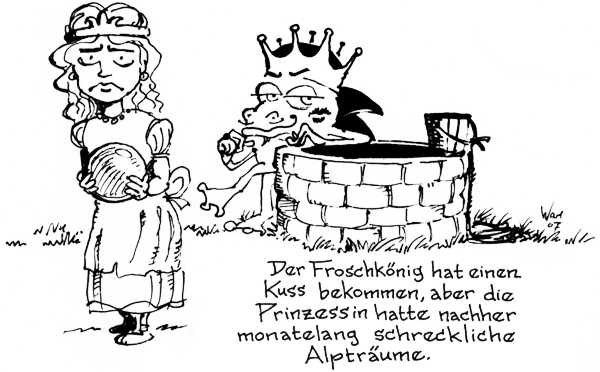6.5.1.5: Conversational past of inseperable prefix verbs
- Page ID
- 108140
Verbs:Das Perfekt - Untrennbare Verben
The participle forms of verbs can be used to build the conversational past, the past perfect and the subjunctive mood. They can also be used as adjectives.
Forming the participle of inseparable prefix verbs
Verbs with inseparable prefixes do not use the ge- prefix to form the participle.
Otherwise, the participle of inseparable prefix verbs is formed based on how the original verb was formed. If the original verb was
- regular, the participle of the inseparable prefix verb will also take the -t suffix.
- irregular, the participle of the inseparable prefix verb will also be irregular (most often includes a stem-vowel change and definitely no -t suffix).
| infinitive (basic verb) | participle | infinitive (separable prefix verb) | participle | |||
| irregular verbs | ||||||
| fallen (fall) | => | gefallen | ==> | zerfallen (fall apart) | => | zerfallen |
| kommen (come) | => | gekommen | ==> | bekommen (receive) | => | bekommen |
| regular verbs | ||||||
| warten (wait) | => | gewartet | ==> | erwarten (expect) | => | erwartet |
| suchen (look for) | => | gesucht | ==> | versuchen (try) | => | versucht |
Haben vs. sein
Some sineparable prefix verbs take haben as the auxiliary verb (e.g., beginnen => hat begonnen), some take sein (e.g., zerfallen => ist zerfallen). The choice of auxiliary verb, just like with all other verbs, depends on the meaning of the word.
I. Verbs, including ones that have an inseparable prefix, that indicate
- a movement (e.g., gehen, fahren, fliegen, kommen),
- a change in state or feeling (e.g., sterben, werden), OR
- indicate a state of being (e.g., bleiben, sein)
... use sein as the auxiliary verb to form the conversational past.
II. Inseparable prefix verbs that (can) have a direct object OR that do not denote an action that results in a change of state or being use haben as the auxiliary verb to form the conversational past.
| Die Prinzessin ist zum Brunnen gekommen. | The princess came to the well. |
| Aber ihr Weltbild ist bald zerfallen! | But her world soon fell apart! |
| Ihr Ball ist in den Brunnen hineingefallen. | Her ball fell into the well. |
| Sie hat erwartet, dass der Froschkönig ihr den Ball zurückgibt. | She expected that the frog king would give her ball back to her. |
| Der Froschkönig hat versucht, ihren Ball gegen einen Kuss auszutauschen. | The frog prince tried to exchange her ball for a kiss. |
| Er hat auch einen bekommen, aber die Prinzessin hatte nachher monatelang schreckliche Alpträume gehabt!! | And he got one too, but the princess had terrible nightmares for months afterwards! |

Here are some key participle forms you should learn:
| infinitive | english | participle form |
| beginnen begreifen bekommen besprechen besuchen beantworten |
begin, start recognize, realize, understand get, receive discuss visit answer (a question) |
hat begonnen hat begriffen hat bekommen hat besprochen hat besucht hat beantwortet |
| empfehlen | recommend | hat empfohlen |
| entkommen entlaufen entmutigen entscheiden (sich) entschließen (sich) entspannen (sich) enttäuschen entwickeln (sich zu) |
escape run away from discourage decide decide, determine relax disappoint develop, turn (into) |
ist entkommen ist entlaufen hat entmutigt hat entschieden hat entschlossen hat (sich) entspannt hat enttäüscht hat entwickelt |
| erfahren erfinden erinnern (sich an) erkälten (sich) erkennen erklären erschießen erschrecken (sich) erwarten erzählen |
hear, learn, experience invent remember catch a cold recognize explain shoot (dead) scare, frighten expect tell a story |
hat erfahren hat erfunden hat sich erinnert hat sich erkältet hat erkannt hat erklärt hat erschossen hat erschrocken hat erwartet hat erzählt |
| gefallen (es gefällt mir) gelingen genießen geschehen gewinnen |
please (i.e., it pleases me = I like it) succeed enjoy happen win |
hat gefallen es ist mir gelungen hat genossen ist geschehen hat gewonnen |
| verabreden (sich) verbrechen verbringen (Zeit) verdienen vergeben vergessen vergnügen (sich) verlassen verletzen verlieren verschwenden verschwinden verspäten (sich) verstehen versuchen |
agree on (e.g., a date, appointment) commit a crime spend (time) earn forgive forget enjoy leave, abandon harm, injure lose waste (money, time, resources) disappear be late understand try, attempt |
hat sich verabredet hat verbrochen hat verbracht hat verdient hat vergeben hat vergessen hat sich vergnügt hat verlassen hat verletzt hat verloren hat verschwendet ist verschwunden hat sich verspätet hat verstanden hat versucht |
| zerfallen zerschlagen zerspringen zerstören (jmd./sich) |
fall apart, decay smash up jump apart disturb (the peace)/distroy |
ist zerfallen hat zerschlagen ist zersprungen hat zerstört |


